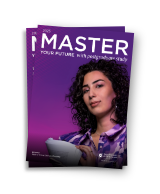
Graduate Diploma in Urban and Regional Planning
Overview
Graduate confident and well-prepared for work, with skills gained through a program designed in consultation with industry to provide you with the ideal balance of theoretical content and practical experience.
The Graduate Diploma in Urban and Regional Planning is designed for recent graduates in any field, and for established professionals who wish to extend their skills and expertise. It will also help provide a preparation for entry into a masters program.
For your one year of full-time studies, you'll select from more than 20 courses, providing you with a high level of specialised knowledge together with valuable skills associated with your selected areas of study.
Graduates from UQ's Urban and Regional Planning program are sought after by employers for their ability to make environmentally, socially and economically sustainable decisions, and can expect to find employment in a variety of roles in both public and private sectors.
Program highlights
- Learn from Australia’s best planning practitioners in a program recognised by employers as delivering high-quality, job-ready graduates.
- Tailor your program to match your career goals through practical and flexible elective courses.
- Benefit from collaborative learning spaces, such as the $1.5 million Planning Studio, that allow you to integrate maps, plans and computers while working together as a group and with external bodies to address real planning challenges.
How you'll learn
Your learning experiences are designed to best suit the learning outcomes of the courses you choose.
- Lectures
- Tutorials
- Workshops
What you'll study
At UQ, degrees are called 'programs' and subjects are called 'courses'. Here's a sample of the courses you could study in this program:
- Strategic Planning: Theory & Practice
- Climate Change & Environmental Management
- Community Planning & Participation
- Applied Demography
- Transport Planning
- Planning Practicum
Career possibilities
Postgraduate study can take you anywhere. Here are some of the careers you could be on your way to:
- Urban and regional planner
- Development assessment officer
- Urban designer
- Land-use planning coordinator
- Heritage conservation officer
- Transport planner
- Regional development officer
- Spatial planner
- Commercial and industrial development officer
- Strategic planner
Stories
See all stories
Study tips
Why choose UQ for environmental studies?
6-minute read

UQ people
The Gen Z housing crisis: what needs to change?
6-minute read

Study tips
Study environmental conservation as a postgrad at UQ
5-minute read
Stories
See all stories
Study tips
Why choose UQ for environmental studies?
6-minute read

UQ people
The Gen Z housing crisis: what needs to change?
6-minute read

Study tips
Study environmental conservation as a postgrad at UQ
5-minute read
Entry requirements
Entry requirements
To be eligible for entry, you'll need:
- a bachelor's degree or above in any discipline, except qualifications accredited by the Planning Institute of Australia.
- a bachelor's degree or above in any discipline, except qualifications accredited by the Planning Institute of Australia.
Related programs
Depending on your previous qualifications and current goals, you might want to consider
one of these related programs:
English language requirements
IELTS overall 6.5; reading 6; writing 6; speaking 6; listening 6. For other English Language Proficiency Tests and Scores approved for UQ
TOEFL iBT (including Paper Edition) - Overall 87, listening 19, reading 19, writing 21 and speaking 19.
PTE Academic - Overall Score of 64 and 60 in all sub bands.
BE - A minimum overall grade of 4 plus a minimum grade of C in all macro skills.
CES - Overall 176 and 169 in all sub bands.
OET is not accepted.
There are other ways to meet the English language requirements. For some programs, additional conditions apply.
Student visas
International students who are accepted into full-time study in the Graduate Diploma in Urban and Regional Planning are eligible to apply for an Australian student visa (subclass 500).
There are a number of requirements you must satisfy before a visa is granted, including the Genuine Student (GS) requirement.
Fees and Scholarships
Indicative annual fee
Approximate yearly cost of tuition (16 units). Your fees will vary according to your selected courses and study load. Fees are reviewed each year and may increase.
$8,948
2024
$8,948
2024
Approximate yearly cost of full-time tuition (16 units). Your fees will vary according to your study load. Fees are reviewed each year and may increase.
AUD $44,960
2024
AUD $44,960
2024
Government assistance
Financial aid
As an international student, you might be eligible for financial aid – either from your home country, or from the Australian Government.
HECS-HELP
Domestic places in the Graduate Diploma in Urban and Regional Planning are Commonwealth Supported. This means the cost of your education is shared between you and the Australian Government.
Instead of tuition fees, Commonwealth Supported students pay what are called student contribution amounts.
HECS-HELP is an Australian Government loan scheme to assist eligible students with the cost of their student contribution amounts.
Centrelink support
The Australian Government offers a number of income-support payments to eligible Australian university students.
Scholarships
You may be eligible for more than 100 scholarships, including:
How to apply
Applying online
All international applications should be submitted to UQ. If you prefer, you can use an approved UQ agent in your country.
The program code for the Graduate Diploma in Urban and Regional Planning is 5116.
Find out more about applying for postgraduate coursework study
Applying online
All domestic applications should be submitted to UQ.
The program code for the Graduate Diploma in Urban and Regional Planning is 5116.
Find out more about applying for postgraduate coursework study
Important dates
The closing date for this program is:
- To commence study in semester 2 - May 31 of the year of commencement.
- To commence study in semester 1 - November 30 of the previous year.
To learn more about UQ dates, including semester start dates, view the Academic Calendar.
Important dates
The closing date for this program is:
- Semester 1 - Monday before semester 1 commences. Contact School for details.
- Semester 2 - Monday before semester 2 commences. Contact School for details.
To learn more about UQ dates, including semester start dates, view the Academic Calendar.
Aboriginal and Torres Strait Islander applicants
For support with applying – or if you have any questions about university life – get in touch with our Aboriginal and Torres Strait Islander Studies Unit.
Explore other programs
Express yourself. And your interest.
They say choosing a degree is hard, which is why we've made it easy. Register your interest and we'll send you everything you need to know about applying to UQ.

